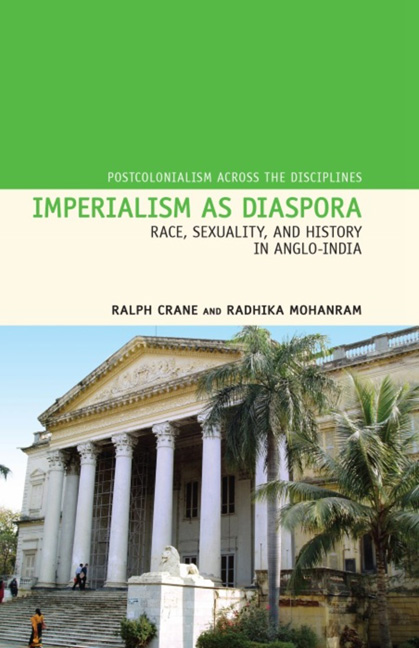Book contents
- Frontmatter
- Contents
- List of Illustrations
- Acknowledgements
- Introduction: Race, Gender, and Diaspora: Explorations of Anglo-India
- 1 Masculinity Forged Under Siege: The Indian Mutiny of 1857
- 2 The Terrains of Identity: Mimicry and the Great Game
- 3 The Missionary's Position: Love and Passion in Anglo-India
- 4 The Laws of Desire: Intimacy and Agency in Anglo-India
- Epilogue: Imperialism as Diaspora
- Bibliography
- Index
3 - The Missionary's Position: Love and Passion in Anglo-India
- Frontmatter
- Contents
- List of Illustrations
- Acknowledgements
- Introduction: Race, Gender, and Diaspora: Explorations of Anglo-India
- 1 Masculinity Forged Under Siege: The Indian Mutiny of 1857
- 2 The Terrains of Identity: Mimicry and the Great Game
- 3 The Missionary's Position: Love and Passion in Anglo-India
- 4 The Laws of Desire: Intimacy and Agency in Anglo-India
- Epilogue: Imperialism as Diaspora
- Bibliography
- Index
Summary
In this chapter, we will examine Anglo-Indian fiction featuring missionaries, as they, along with working-class whites and non-commissioned soldiers in India, belied the image of the ‘bourgeois aristocracy’ that largely underpinned Anglo-Indian fiction, as well as popular representations of the Raj in the British imagination. Considered to be members of the lower-middle class, the missionaries problematized the boundaries around whiteness, through living in close proximity to native lines and their daily interactions and intimacy with native lives. In a hierarchical system frequently likened to the Indian caste system, with the ‘heaven born’ members of the Indian Civil Service (ICS) at the top, missionaries, like the domiciled whites, Eurasian community, and British Other Ranks ‘all considered to be on a par with the lower castes, were either ignored or patronized by the rest of the Anglo-Indian community’ (Collingham 155). Their socially ambivalent position was further compounded by their strong sympathy for the native population, as if such an emotion provided a barrier to their ability to think within the white imperial frame that enabled their very presence in India.
While not being white enough for the Anglo-Indian community on the one hand; on the other hand, Indians saw missionaries as forcing alien, white systems of faith on them. Indeed, Christianity's association with the West and modernity that filtered through the missionaries in India seemed to suggest that other forms of religious beliefs were archaic and outmoded. Christian missionaries in India functioned at the nexus of modernity, colonial politics, and whiteness, provoking discomfort amongst the local population. In this chapter, we unpick the ambivalent nature of missionary fiction, not only within the context of race, but also within the form of the narrative structures of the Anglo-Indian novel itself. Indeed, the Anglo-Indian novel is generally perceived as belonging to the genre of romance, as they contained within them a marriage plot, with the male and female protagonists falling in love against the exoticism of India. Evoking genealogy from the Anglo-Indian romance written by women and the Mills and Boon/Harlequin romances, Hsu-Ming Teo suggests that: ‘The colonial order was necessary for the production and sustenance of romantic fantasies’ (2).
- Type
- Chapter
- Information
- Imperialism as DiasporaRace, Sexuality, and History in Anglo-India, pp. 83 - 107Publisher: Liverpool University PressPrint publication year: 2013



